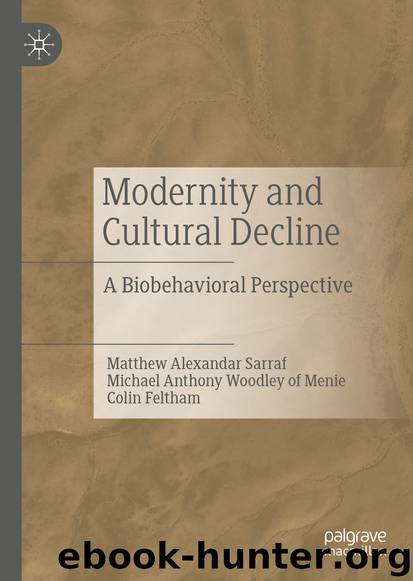Modernity and Cultural Decline by Matthew Alexandar Sarraf & Michael Anthony Woodley of Menie & Colin Feltham

Author:Matthew Alexandar Sarraf & Michael Anthony Woodley of Menie & Colin Feltham
Language: eng
Format: epub
ISBN: 9783030329846
Publisher: Springer International Publishing
Is Bias Sufficient to Explain Declinism?
Pinker (2018) argues that “the negative coloring of misfortunes [in autobiographical memory] fades with time,” and that this, along with the degradation of people’s faculties with age, is the reason that people are “wired for nostalgia,” that is, tend to see the world as in decline (p. 48). Together with negative news and the availability heuristic and negativity bias (discussed in the summary above), Pinker seems to believe that declinism, that is the idea that the world or at least some society or culture is getting worse, can be explained away in terms of distorted cognition. (Protzko & Schooler, 2019 also attempt to explain declinism about desirable human traits in terms of psychological biases, never giving any serious attention to evidence that indicates that it has substantive bases [see above for evidence relevant to at least one of the traits that they consider], saying only that they “cannot rule out actual declines [in desirable human traits; emphasis added],” which almost seems to presume that evidence has been favoring the non-reality of such declines.)
As with so much else in EN , Pinker’s treatment of declinism is blind to contradictory evidence. Steenvoorden and van der Meer (2017) and Turchin (2016, see also Turchin, 2010) both provide empirical evidence that social pessimism is significantly related to adverse developments in, for example, economics and politics, making it difficult to attribute this attitude solely to bias. Turchin’s (2010, 2016) analyses are especially interesting, since they involve long-run historical data indicating that “the United States and Western Europe [are likely to experience growing political instability]” (2010, p. 608). Turchin offered this prediction in 2010, and in light of the election of Donald Trump, Brexit, and related events, he has been at least partially vindicated.
Odd aspects of Pinker’s attempt to blame some amount of pessimistic sentiment in the West on negative news require comment. As argued above, there is reason to believe that members of more individualistic cultures are more prone to self-serving biases, potentially giving them an artificial advantage in SWB compared to members of less individualistic cultures. In keeping with this possibility, the casual observer will note that Western cultures, which are highly individualistic, are bloated with “therapeutic” ideas and media products of various sorts, some of which come close to explicitly promoting the cultivation of pleasant delusions to enhance mood and outlook (e.g. Peale, 1959). The relatively recent and enormous success of the positive psychology movement indicates that this phenomenon has not abated. And yet while Pinker is willing to contend that the news has made Western people unduly pessimistic, he never considers the possibility that this “therapeutic” culture, and associated delusions, is behind increases in happiness that he insists have occurred in some parts of the West. Why is only one aspect of media culture thought to matter?
Pinker (2018) tries to empirically substantiate his association of increasingly negative news with deepening pessimism, but only succeeds in contradicting himself again. For example, readers are informed that news watchers have heightened anxiety and depressed mood (p.
Download
This site does not store any files on its server. We only index and link to content provided by other sites. Please contact the content providers to delete copyright contents if any and email us, we'll remove relevant links or contents immediately.
Rewire Your Anxious Brain by Catherine M. Pittman(17581)
Talking to Strangers by Malcolm Gladwell(11865)
The Art of Thinking Clearly by Rolf Dobelli(8836)
Mindhunter: Inside the FBI's Elite Serial Crime Unit by John E. Douglas & Mark Olshaker(7830)
Becoming Supernatural by Dr. Joe Dispenza(7100)
Change Your Questions, Change Your Life by Marilee Adams(6637)
Nudge - Improving Decisions about Health, Wealth, and Happiness by Thaler Sunstein(6629)
The Road Less Traveled by M. Scott Peck(6627)
The Lost Art of Listening by Michael P. Nichols(6465)
Enlightenment Now: The Case for Reason, Science, Humanism, and Progress by Steven Pinker(6404)
Win Bigly by Scott Adams(6306)
Mastermind: How to Think Like Sherlock Holmes by Maria Konnikova(6227)
The Way of Zen by Alan W. Watts(5790)
Daring Greatly by Brene Brown(5636)
Grit by Angela Duckworth(4729)
Big Magic: Creative Living Beyond Fear by Elizabeth Gilbert(4719)
Men In Love by Nancy Friday(4315)
Flow by Mihaly Csikszentmihalyi(4047)
The Four Tendencies by Gretchen Rubin(4018)
